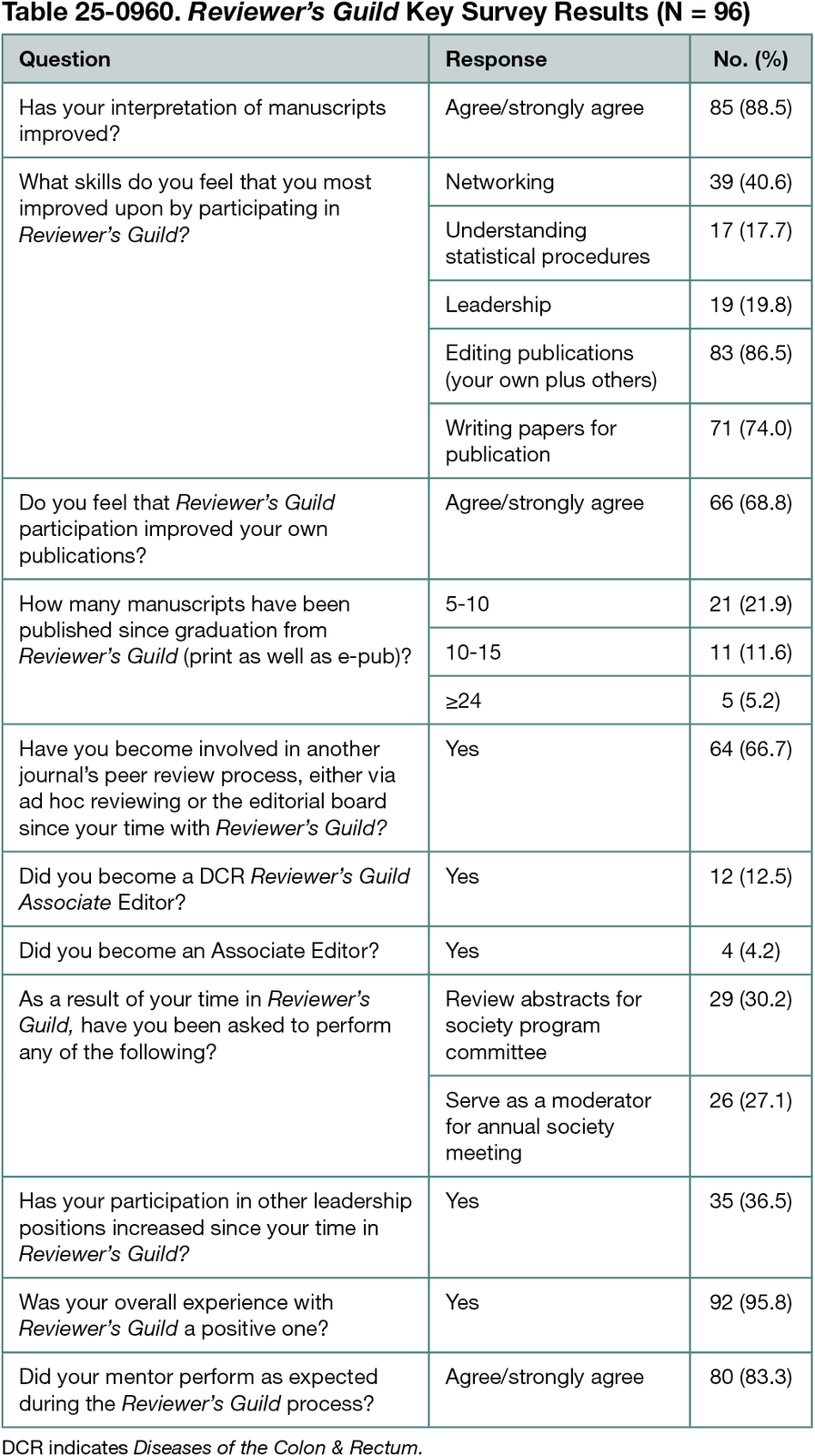Quality of an Educational Program to Empower Early Career Faculty and Trainees Through Mentored Training in Peer Review
Abstract
Susan Galandiuk,1 Vaitheesh Jaganathan,2 Hillary Simon1
Objective
Despite advances in electronic manuscript submission systems, the editorial peer review process for medical journals has had few fundamental changes aside from promptness of review. In 2018, the editor of a society-owned journal created the Reviewer’s Guild, a mentored 1-year peer-review training program designed for surgical trainees, fellows in specialty training, and young academic faculty. The goal of the program was to attract the brightest individuals in the field, elevate the quality of peer review, and create a feeling of loyalty toward the journal. The program consists of a formal curriculum followed by 5 mentored reviews of full-length manuscripts. Reviews are graded by both mentors and assigned editors. Competitive program admission is by board member nomination and is limited to 45 individuals per year. From 2019 to 2025, 182 graduates completed the program. Reviewer’s Guild members are primarily (83%) from the United States, but 10 other countries are represented. Surveys of each year’s class are used for program improvement. Based on feedback, improvements included increased opportunities to learn statistical skills, networking, and leadership roles. The objective of this study was to report a separate 5-year survey to assess overall participant satisfaction with the program and career impact, particularly with respect to publishing, networking, and career opportunities.
Design
This cohort study sought to evaluate the impact of a mentored peer review program. The STROBE1 reporting guideline was followed. An anonymous online questionnaire regarding the program was developed and emailed to graduates. The summative survey evaluated nomination pathway, mentor participation, leadership, and networking opportunities resulting from program participation as well as publication output.
Results
Ninety-six of the 182 graduates (52.8%) responded. Key survey responses are shown in Table 25-0960. Nearly all respondents reported enhanced understanding of the editorial process. Eighty-eight respondents (91.7%) had a generally positive experience and believed that the program improved the quality of their own publications and interpretation of others’ work. Seventeen respondents (17.7%) said they had improved understanding of statistical principles. Thirty-seven respondents (38.5%) published 5 or more manuscripts since graduating from the Reviewer’s Guild, 64 (66.7%) became involved with other journals (as ad hoc reviewers or editorial board members), and 16 (16.7%) of the highest performers received Reviewer’s Guild board or full editorial board appointments to the journal.

Conclusions
The Reviewer’s Guild learning model appears to improve early career faculty and trainee peer review skills and leadership opportunities. While there are no comparisons with individuals who did not do the training, mentors saw improvement in review quality over the course of the program. In addition, graduates become loyal reviewers for the journal following graduation and are tracked as program graduates. As participants were surgeons, results may not be generalizable to other specialties. Such programs allow participants to become more involved in the editorial process and may potentially lead to journal leadership and career opportunities.2,3
References
1. von Elm E, Altman DG, Egger M, Pocock SJ, Gøtzsche PC, Vandenbroucke JP; STROBE Initiative. The Strengthening the Reporting of Observational Studies in Epidemiology (STROBE) statement: guidelines for reporting observational studies. BMJ. 2007;335(7624):806-808. doi:10.1136/bmj.39335.541782.AD
2. Isaacson RA, Bay SN, McCarty MM. Supporting the next generation of researchers: GENETICS peer review training program. Sci Ed. 2020;43:77. doi:10.36591/SE-D-4303-77
3. Lyons-Warren AM, Aamodt WW, Strowd R, Pieper KM, Merino JG. Assessment of a structured and mentored peer review curriculum on quality of peer review. Abstract presented at: Ninth International Congress on Peer Review and Scientific Publication; September 8-10, 2022; Chicago, IL. Accessed July 1, 2025. /wp-content/uploads/2022/11/Program2022.pdf
1Division of Colon & Rectal Surgery, University of Louisville, Louisville, KY, US, s0gala01@louisville.edu; 2Price Institute for Surgical Research, University of Louisville, Louisville, KY, US.
Conflict of Interest Disclosure
Susan Galandiuk receives a stipend for services as editor of the journal Diseases of the Colon & Rectum from the American Society of Colon and Rectal Surgeons.
